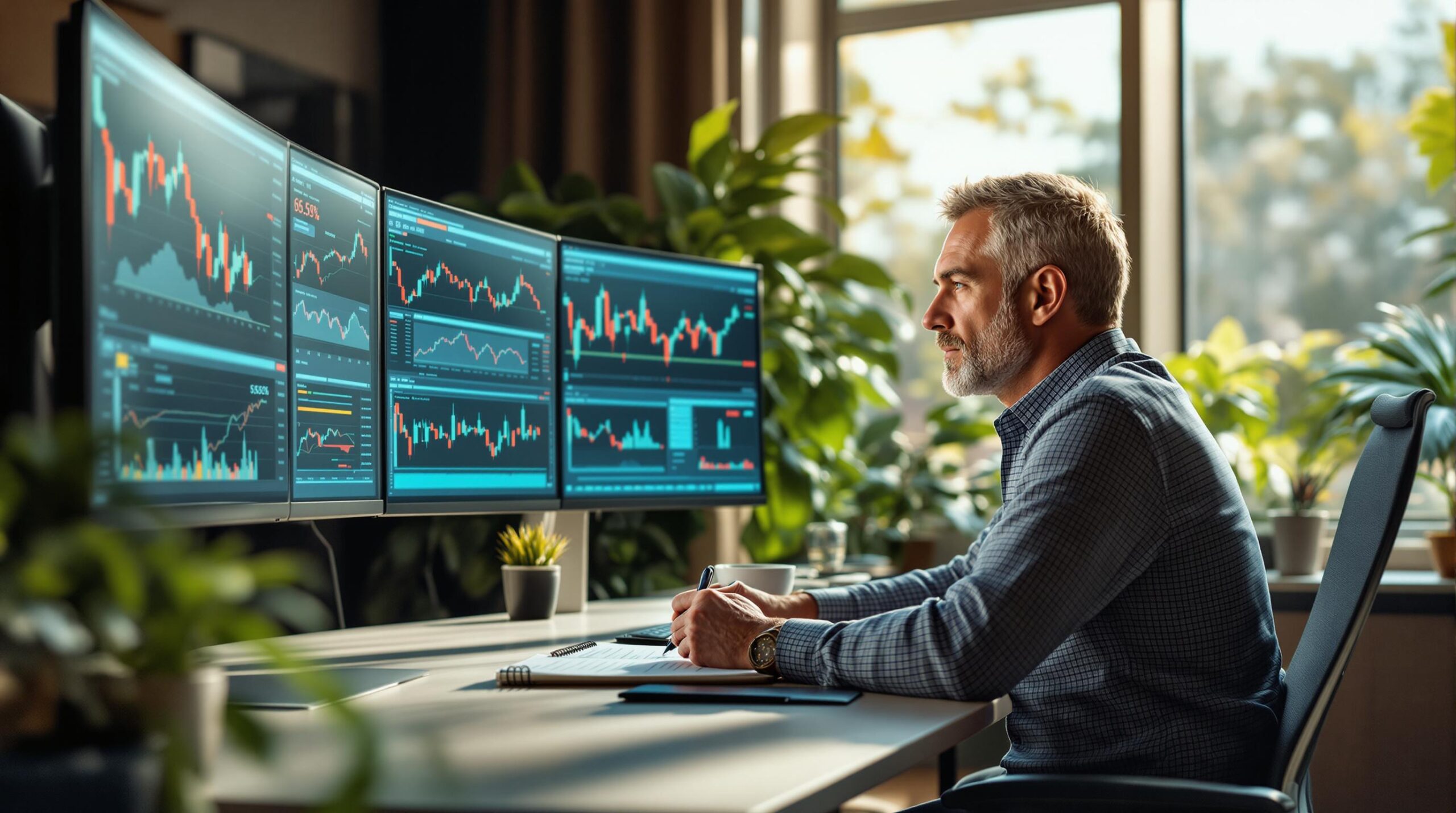How Market Volatility Affects Trader Psychology
Understand how market volatility impacts trader psychology and discover strategies to maintain emotional balance and effective risk management.

Market volatility can cause rapid price changes, leading traders to make emotional and impulsive decisions. Fear, greed, and overconfidence often result in poor risk management and missed opportunities. To handle these challenges:
- Create a Trading Plan: Define entry/exit points and risk limits.
- Use Risk Management Tools: Stop-loss orders, position sizing, and isolated margin trading help control losses.
- Address Emotional Triggers: Practice mindfulness, take breaks, and track emotional patterns.
- Learn from Losses: Review trades to identify and correct biases like overconfidence or loss aversion.
Stop Trying to CONTROL Your Emotions!
Mental Challenges During Market Volatility
Managing Fear, Greed, and Stress
Market volatility can amplify emotions, making it tougher to think clearly and make sound decisions. Fear often leads to exiting too soon, greed pushes traders toward risky leverage, and stress can cause indecision. These reactions can seriously hurt trading outcomes.
Defx offers tools like preset risk controls and isolated margin trading to help traders stick to their strategy, even when emotions are running high. These features aim to reduce impulsive actions and keep trading on track.
But emotions aren’t the only hurdle – cognitive biases also play a big role in decision-making during uncertain markets.
Common Trading Biases
Cognitive biases can cloud judgment, especially in volatile markets. One major bias is loss aversion, where traders hold onto losing positions too long, hoping for a turnaround, while being too quick to lock in profits on winning trades [3]. This mindset can lead to poor outcomes during market swings.
Another common pitfall is overconfidence after a few winning trades. This can result in ignoring risks, skipping stop-losses, and taking on more than one can handle. These behaviors often lead to:
- Missing critical market signals
- Taking unnecessary risks
- Neglecting stop-loss levels
- Overestimating personal trading skills
Trader Fatigue
The constant monitoring required during volatile periods can wear traders out mentally. Fatigue reduces focus, clouds judgment, and weakens risk management.
To fight fatigue, consider setting clear trading hours, taking breaks, automating repetitive tasks, and prioritizing good sleep habits. These steps can help maintain sharpness and reduce burnout.
Developing emotional intelligence and staying disciplined are key to overcoming these mental hurdles [2]. By addressing these challenges head-on, traders can better handle market swings while safeguarding their mental health and trading performance.
sbb-itb-dd9e24a
Methods for Emotional Control in Trading
Creating a Trading Plan
A solid trading plan serves as your emotional safety net. By setting clear rules and boundaries before entering a trade, you can avoid making impulsive decisions.
Your plan should outline specific entry and exit points, risk tolerance, and position sizing. For instance, the one-percent rule – where you risk no more than 1% of your account per trade – helps safeguard your capital and reinforces discipline [1].
Research from the IMT Institute found that traders who consistently stick to predefined stop losses experience 65% less emotional stress during market downturns [2].
But beyond the plan itself, staying emotionally steady is key to making consistent, rational decisions.
Mental Balance Techniques
Keeping your emotions in check involves both proactive steps and real-time strategies. For example, trading smaller positions during volatile periods can significantly ease emotional strain [2].
Other helpful practices include mindfulness exercises, taking regular breaks, analyzing broader market trends, and tracking your emotional responses in a journal. These habits can sharpen your focus and help you stay composed.
While these techniques help manage stress, risk management tools provide a structured way to minimize losses and maintain discipline.
Risk Management Tools
Platforms like Defx offer built-in features to help enforce your trading plan, such as isolated margin trading and preset risk controls.
Here’s how some key tools can be used effectively:
| Tool Type | Purpose |
|---|---|
| Stop-Loss Orders | Automatically close trades to cap losses |
| Position Sizing | Limit each trade to 1-2% of your capital |
| Leverage Controls | Use isolated margin to avoid overextension |
"Effective trading psychology channels emotions productively rather than suppressing them." – Ultima Markets [2]
The trick is to use these tools consistently, not just when it feels convenient. When applied properly, they create a structured system that minimizes emotional decision-making and protects your investments.
Strengthening Mental Toughness
Learning from Trading Losses
Trading losses can be valuable learning moments when viewed with the right mindset. By reviewing past trades, traders can uncover patterns in their behavior. For instance, if impulsive decisions driven by FOMO (fear of missing out) are a recurring issue, recognizing this can lead to better emotional control in future trades.
"Emotionally intelligent trading: developing emotional intelligence is essential for traders. By being aware of our emotions and how they can influence our decisions, we can better manage the risks associated with market volatility." – Faster Capital [2]
After identifying these patterns, traders can focus on strengthening their technical and strategic abilities, which are key to handling unpredictable markets with more confidence.
Improving Trading Skills
Building expertise in trading lays the groundwork for staying composed during market swings. Developing these skills involves a mix of targeted approaches:
| Skill Development Area | Purpose | How to Practice |
|---|---|---|
| Technical Analysis | Understand market trends and behavior | Analyze charts regularly |
| Risk Assessment | Make informed decisions under pressure | Use demo accounts to simulate scenarios |
| Market Knowledge | Reduce stress caused by uncertainty | Follow market updates and news consistently |
Platforms like Defx provide tools such as isolated margin trading, enabling traders to practice risk management effectively while honing their skills in a controlled environment.
However, technical skills alone aren’t enough. Mental toughness also thrives when there’s a healthy balance between trading and personal life.
Maintaining Work-Life Balance
Balancing work and personal life is a powerful yet often overlooked strategy for staying focused and emotionally steady in trading. Activities like exercise and socializing help lower stress levels and promote emotional well-being. Setting clear boundaries between trading hours and personal time is crucial to avoid burnout and make better decisions.
Consider structuring your trading day with intentional breaks:
| Time Block | Activity | Mental Benefit |
|---|---|---|
| Morning | Market Analysis | Improved clarity |
| Mid-Day | Physical Exercise | Stress relief |
| Afternoon | Trading Session | Enhanced focus |
| Evening | Personal Time | Recovery and relaxation |
Conclusion: Managing Market Volatility
Key Takeaways
Handling market volatility requires a thoughtful approach that blends emotional control with structured trading strategies [2]. Successful traders focus on managing their reactions to market swings rather than attempting to predict them.
By combining these principles with the right tools, traders can reinforce their discipline and maintain emotional balance.
Tools and Platforms for Trading
Modern trading platforms offer features designed to support traders during unpredictable market conditions. For instance, Defx provides isolated margin trading and rapid order matching, both of which help traders stay disciplined and manage risks effectively.
Here’s how specific tools can support emotional and risk management:
| Feature | Helps With | Risk Management Benefit |
|---|---|---|
| Isolated Margin | Eases concerns about losses | Restricts potential losses |
| Fast Order Matching | Reduces stress during trades | Ensures better position control |
| Position Monitoring | Offers a clear market overview | Encourages disciplined trading |






